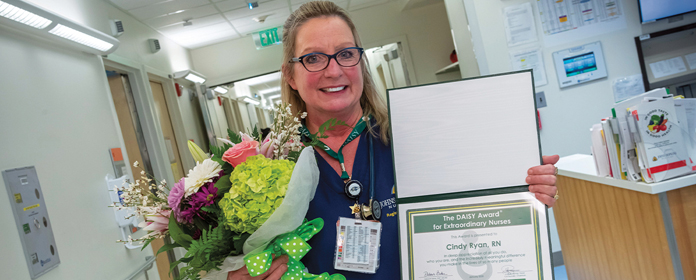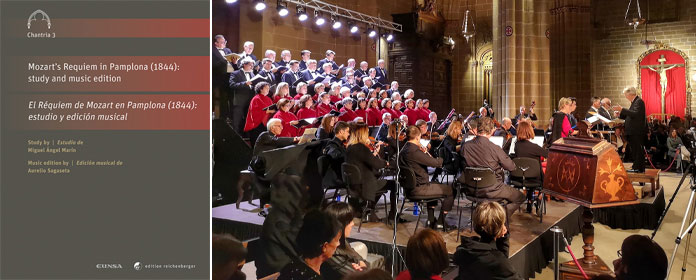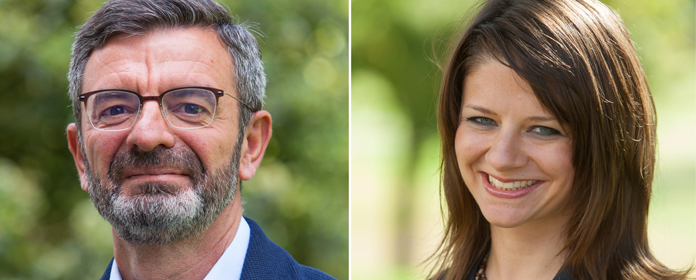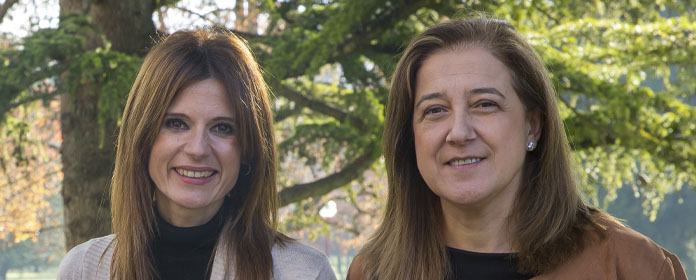Unidad de Ciencia de Datos del ICS: dos años impulsando la interdisciplinariedad y el rigor matemático en investigaciones de la Universidad
Jesús López Fidalgo, director del grupo, explica que en este tiempo han colaborado en publicaciones científicas en campos como la salud, la arquitectura y la moda
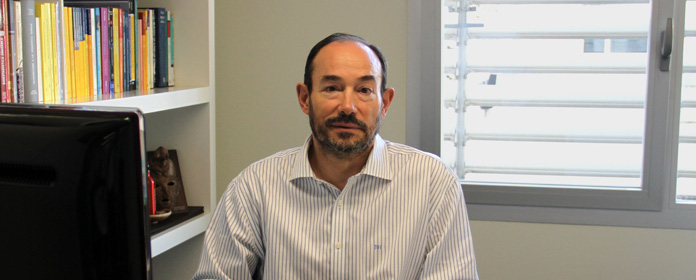
FOTO: Elena Beltrán
La Unidad de Ciencia de Datos del Instituto Cultura y Sociedad (ICS) se creó hace dos años con un enfoque transversal, con el objetivo de fomentar la colaboración científica con los investigadores del centro y del resto de la Universidad. Desde su puesta en marcha, ha ofrecido asesoramiento estadístico en proyectos de numerosos ámbitos, como la salud, la arquitectura, la moda…
“Queremos ser capaces de trasladar a los investigadores del campus los beneficios de contar con nosotros como parte de su equipo, no como meros técnicos o asesores, sino colaboradores”. Así expresa el director de la Unidad, Jesús López Fidalgo, uno de los principales retos que afrontan.
Como ejemplo de cooperación fructífera destaca el trabajo con el Programa ATLANTES, una línea del ICS centrada en la promoción de los cuidados paliativos. La Unidad ha aportado su experiencia en el desarrollo y la validación de encuestas en diversas publicaciones relacionadas con temas como la formación de los profesionales sanitarios, el desarrollo de rankings de países o el deseo de morir de los pacientes.
Fuera del ICS, una de las colaboraciones más destacadas en el campus ha sido con SAVIArquitectura (Sostenibilidad Ambiental Vivienda Industrialización y Arquitectura), un grupo de la Escuela de Arquitectura que investiga en el campo del ecodiseño de cerramientos industrializados y sostenibles, y la cuantificación de la arquitectura sostenible.
López Fidalgo explica que utilizan un programa de simulación del gasto energético en temperaturas. “La idea general es buscar el mejor modelo, cada uno de ellos de gran complejidad matemática, para conseguir un coste energético mínimo”, apostilla.
Estilos de vida saludable y diagnóstico de ictusAsimismo, en la Clínica Universidad de Navarra cooperan en dos proyectos. Uno tienen que ver con estilos de vida y riesgo de desarrollar una enfermedad. “Así los médicos pueden aconsejar de forma personalizada a los pacientes sobre dieta, peso, ejercicio físico…”, comenta. El otro versa sobre el diagnóstico de eventos cardiovasculares.
Algunos doctorandos también han llamado a las puertas de la Unidad de Ciencia de Datos, según cuenta Jesús López Fidalgo. Ha sido el caso de Patricia San Miguel, que en su tesis ha analizado el tema “Fashion Influentials: liderazgo de opinión y comportamiento de compra en moda. El caso de los millennials”. Con supervisión del grupo desarrolló una encuesta en la red mediante el muestreo por bola de nieve.
Más allá de los límites del campus, la Unidad mantiene colaboración con otras universidades, fundamentalmente con la Universidad de Castilla La Mancha, de la que Jesús ha sido catedrático, y con la de Salamanca. En ambas ejerció como docente e investigador antes de incorporarse al ICS y en ellas formó un grupo de investigación que cuenta con financiación del Plan Nacional de Investigación desde hace años. También se mantienen vínculos profesionales en la actualidad con profesores de la Universidad Pública de Navarra, el instituto Severo Ochoa BCAM del País Vasco, la Universidad Autónoma de Barcelona, La Laguna o Almería, en España, y de UCLA (EE.UU.), Alberta y Manitoba (Canadá), Harvard y Milán (Italia), entre otros campus extranjeros.
López Fidalgo recalca que “es importante aprovechar el conocimiento y la experiencia de otras personas que trabajan en cuestiones próximas a las nuestras”. Por eso han recibido visitas de colaboración en la investigación al ICS en estos dos años de especialistas de centros como el Basque Center for Applied Mathematics (BCAM), y de países como Italia, Canadá, Reino Unido o Egipto.
Consciente de la necesidad de despertar vocaciones estadísticas para garantizar el relevo generacional, la Unidad de Estadística también está presente en propuestas que ayudan a transmitir a los más jóvenes la importancia de la esta disciplina. Una de ellas es ‘Stat Wars: el despertar de los datos’, que surgió como iniciativa de la Red Nacional de Bioestadística y cuenta con el apoyo de la Fundación Española para la Ciencia y Tecnología (FECYT) del Ministerio de Economía, Industria y Competitividad.
La otra es la fase navarra del Concurso ‘Incubadora de Sondeos y Experimentos’, coorganizado con el Departamento de Estadística e Investigación Operativa de la Universidad Pública de Navarra (UPNA), con la colaboración de la Sociedad Navarra de Profesores de Matemáticas “TORNAMIRA” Matematika Irakasleen Nafar Elkartea; del Instituto de Estadística de Navarra; y del Departamento de Educación del Gobierno de Navarra.
Atraer talento al equipoPara Jesús López Fidalgo, todo esto es solo el principio de un largo camino: desea seguir avanzando en estas líneas e impulsar el diseño de experimentos, que es la especialidad del grupo. Para ello, subraya que es clave atraer talento al equipo. En esa línea, este curso se incorporará al grupo Pablo Urruchi, que ha trabajado como científico de datos en la sede de Reino Unido de Avenade, una empresa conjunta de Microsoft y Accenture. En el ICS comenzará su doctorado y ayudará en la coordinación del Título de Especialista en Big Data, que empieza su segunda edición.
López Fidalgo indica que una fórmula para la consolidación es la que se ha puesto en marcha con el proyecto de SAVIArquitectura. Cuenta con financiación de la Unión Europea, lo que ha permitido costear parte del contrato de una persona de la Unidad de Ciencia de Datos (en años anteriores Lissette Álvarez y actualmente Leire Alegría). “Este modelo de cofinanciación es positivo porque varios proyectos pueden compartir la dedicación de un experto en ese campo y, a su vez, nos ayuda a que el grupo pueda crecer y asentarse”, subraya.
Reconoce que el perfil de los estadísticos es muy valorado actualmente, sobre todo por las empresas privadas, y eso dificulta las incorporaciones. “De hecho, dos personas que han trabajado en la Unidad durante este pasado año han continuado su trayectoria por otros rumbos, por ejemplo en la prestigiosa consultora Serikat (sede de Bilbao)”, dice.
Con todo, para él la vida académica tiene un atractivo singular: “Es una gran satisfacción avanzar en el conocimiento y resolver problemas importantes para la sociedad, así como enseñar a las futuras generaciones lo que has ido descubriendo a lo largo de tu trayectoria”. Adicionalmente, recalca la versatilidad del trabajo, pues “la estadística te permite interactuar con investigadores y profesionales de muy diversos campos. Tan pronto te encuentras estudiando las costumbre migratorias de los mirlos, como la retención de la radiación el en cuerpo humano”.
Jesús López FidalgoEs catedrático del ICS. Anteriormente lo fue en la Universidad de Castilla-La Mancha (UCLM). Ha realizado estancias prolongadas de investigación y docentes en las Universidades de Manchester, Glasgow y California (Los Ángeles y Riverside). Es también miembro electo del Instituto Internacional de Estadística.
En la actualidad es presidente electo de la Sociedad de Estadística e Investigación Operativa y editor-jefe de la revista Test. Ha sido gestor del Plan Nacional de Matemáticas en el Ministerio de Ciencia e Innovación (2009-2011) y fue director de la Escuela Técnica Superior de Ingenieros Industriales de la UCLM (2008-2016).
Ha publicado más de 100 artículos en revistas científicas y ha escrito varios libros, entre ellos el de divulgación El azar no existe. Ha dirigido trece tesis doctorales y coordina uno de los 8 nodos de la red nacional de Bioestadística.

